人教版必修一Unit 1 Friendship Grammar 直接引语和间接引语 (共47张PPT)
文档属性
| 名称 | 人教版必修一Unit 1 Friendship Grammar 直接引语和间接引语 (共47张PPT) |  | |
| 格式 | zip | ||
| 文件大小 | 3.2MB | ||
| 资源类型 | 教案 | ||
| 版本资源 | 人教版(新课程标准) | ||
| 科目 | 英语 | ||
| 更新时间 | 2019-01-23 10:27:40 | ||
图片预览




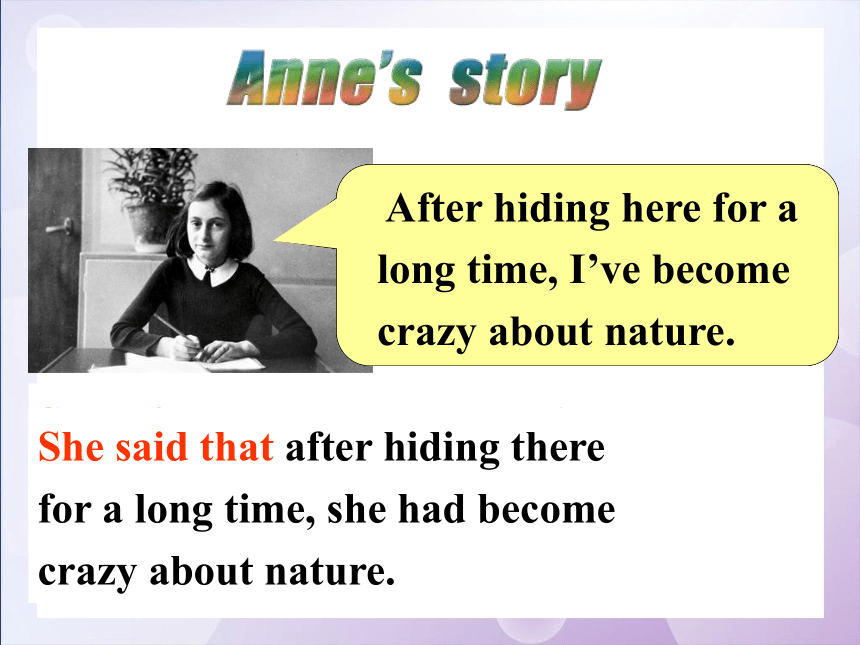

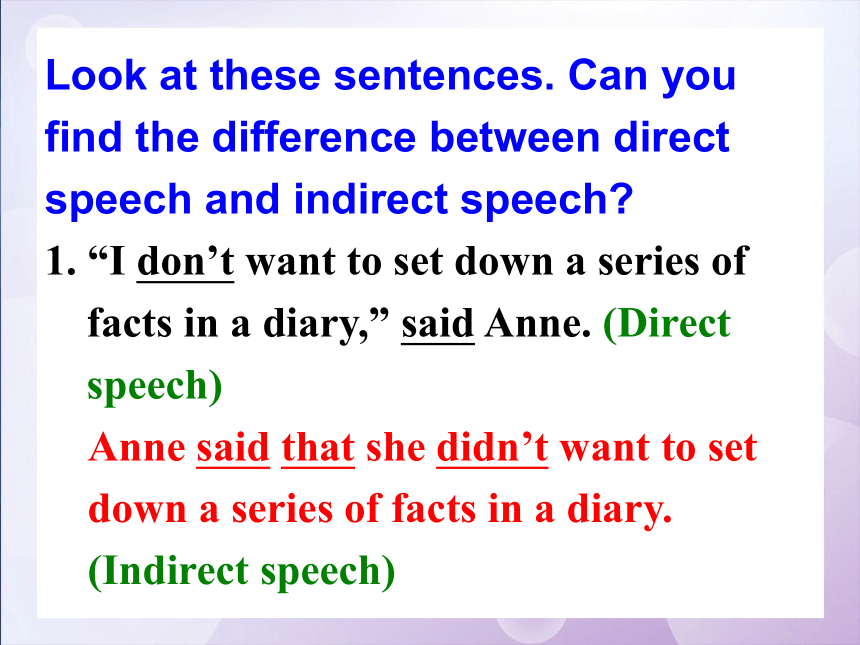
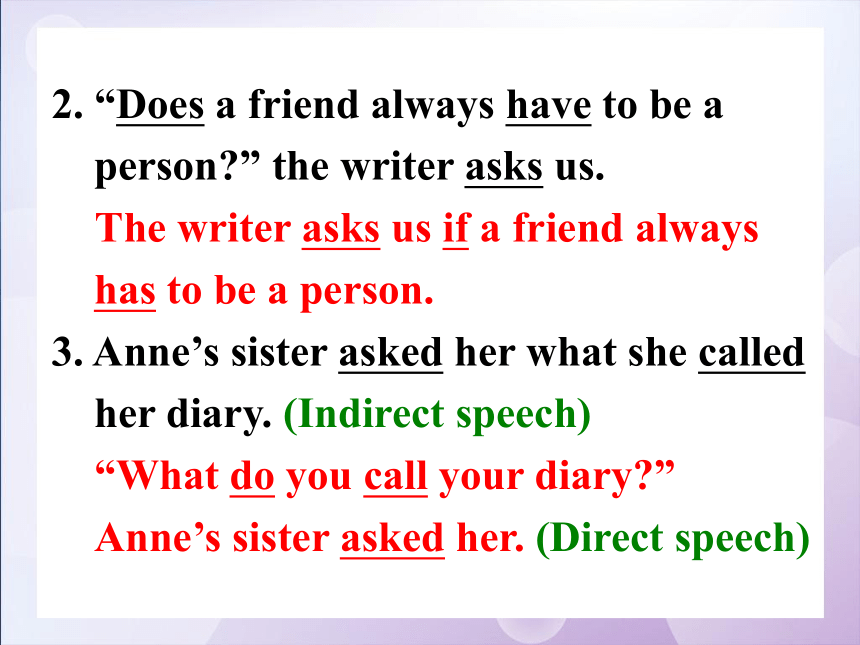
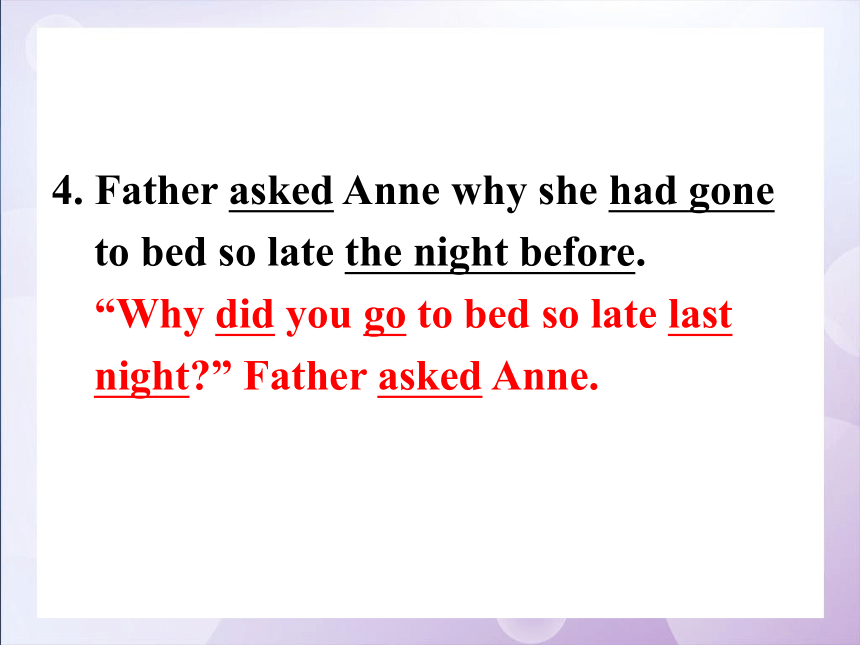
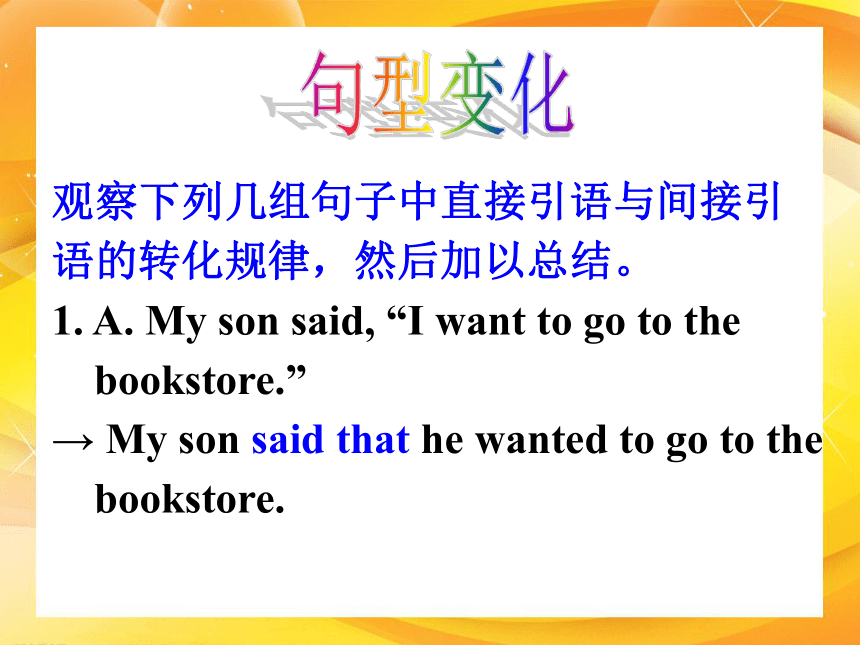


文档简介
课件47张PPT。Unit 1Unit 1 FriendshipTo learn the differences between direct speech and reported speech
To learn the methods to change direct speech into reported speech in different tenses and sentence structures
To learn how to use reported speech in statements and questionsShe said that her name was Anne Frank and her family was Jewish. My name is Anne Frank and my family is Jewish.
My family and I are hiding in Amsterdam.She said that she and her family were hiding in Amsterdam.
My only true friend is Kitty—my diary. She said that her only true friend was Kitty—her diary.
After hiding here for a long time, I’ve become crazy about nature. She said that after hiding there for a long time, she had become crazy about nature.Anne said: “My name is Anne Frank and my family is Jewish.” (Direct speech)She said that she and her family were hiding in Amsterdam. (Indirect speech)引述别人的话语一般用两种方式: 一是原封不动地引用原话, 放在引号内, 叫直接引语(Direct speech); 一是用自己的话加以转述, 这叫间接引语(Indirect speech)。Look at these sentences. Can you
find the difference between direct
speech and indirect speech?
1. “I don’t want to set down a series of facts in a diary,” said Anne. (Direct speech)
Anne said that she didn’t want to set
down a series of facts in a diary.
(Indirect speech)2. “Does a friend always have to be a person?” the writer asks us.
The writer asks us if a friend always has to be a person.
3. Anne’s sister asked her what she called her diary. (Indirect speech)
“What do you call your diary?” Anne’s sister asked her. (Direct speech)4. Father asked Anne why she had gone to bed so late the night before.
“Why did you go to bed so late last night?” Father asked Anne.观察下列几组句子中直接引语与间接引
语的转化规律,然后加以总结。
1. A. My son said, “I want to go to the bookstore.”
→ My son said that he wanted to go to the bookstore.句型变化直接引语是陈述句,变为间接引语时,在多数情况下都构成一个由 ______引导的宾语从句,引述动词通常是______, ________等。thatsaytellB. I said to Jack, “You didn’t tell me what happened yesterday.”
→ I told Jack that he hadn’t told me what had happened the day before.2. A. “Are you ready?” the teacher asked Tom.
→ The teacher asked Tom if / whether he was ready.
B. He asked John, “Were you playing football at this time yesterday?”
→ He asked John if / whether he was playing football at that time the day before.直接引语是一般疑问句,变为间接引语时,常将它变成由连词________或________引导的宾语从句,其主句动词常用ask。ifwhether3. A. My mother asked me, “Do you like the red or the yellow?”
→ My mother asked me whether I liked the red or the yellow.
B. I asked him, “Will you stay at home or go for a walk tonight?”
→ I asked him whether he would stay at home or go for a walk that night.直接引语为________疑问句,变为间接引语时,常将它改变成由____________引导的宾语从句。选择whether ... or4. A. “How do you go to work, Mary?” she asked.
→ She asked Mary how she went to work.
B. Kate asked, “What is your favorite book, Tom?”
→ Kate asked Tom what his favorite book was.直接引语为________疑问句,变为间接引语时,就将它变成由疑问词引导的宾语从句。特殊直接引语里的第一人称和第二人称,变间
接引语时,人称要做相应调整。如:
1. She said, “I am hungry.”
She said she was hungry.
2. Mum said to me, “You can do it yourself.”
Mum told me that I could do it myself.
3. Mr. Smith said, “He is a good worker.’’
Mr. Smith said that he was a good worker. 人称变化1. Jack said to me, “You look worried today.”
Jack told me that __ looked worried that day.
2. We said to her, “They’re cleaning the room.”
We told her that ____ were cleaning the room.
3. Mr. Black said, “I have walked a long way.”
Mr. Black said that __ had walked a long way. I theyhe直接引语变间接引语时,间接引语的时态要与主句的时态一致。He says, “I treat you as my son.”
He says that he treats me as his son.1. 主句为一般现在时, 现在完成时或一般将来时的时候, 间接引语时态不变。时态变化一般现在时
“I know it,” he said.一般过去时
He said he knew it. 2. 主句为过去时, 从句要跟着相应的变化。 现在进行时
“I’m making coffee for you all,” she said.过去进行时
She said she was making coffee for us all. 现在完成时
“I have seen her before,” said he. 过去完成时
He said he had seen her before. 现在完成进行时
He said, “I have been doing it for hours.”过去完成进行时
He said he had been doing it for hours. 一般过去时
“I saw her last Monday,” he said.过去完成时
He said he had seen her the previous Monday. 过去进行时
“I was waiting for Jim,” she said. 过去进行时
She said she was waiting for Jim.一般将来时
He said: “We shall start tomorrow.”过去将来时
He said they would start the next day.过去完成时
“Rick had been ill for many days till he died.” Jack said.过去完成时
Jack said Rick had been ill for many days till he died. 一般现在时
现在完成时
现在进行时
一般将来时
一般过去时一般过去时
过去完成时
过去进行时
过去将来时
过去完成时过去完成时
过去进行时不变1. “It is really cold,” she said to me.
She told me that it ____ really cold.was2. “I don’t want to go there with Alice,” said Tom.
Tom said that he ______ want to go there with Alice.didn’t3. The boy said, “I will be a pilot.”
The boy said that he ________ a pilot.would be4. Tom said, “We are listening to music.”
Tom said that they ______________
music.were listening to5. Mike said, “I have finished my
homework.”
Mike said _____________ his homework.he had finished 直接引语 间接引语时 间 状 语 now
today
this week
yesterday
last week
four days ago
tomorrow
next month
the day after tomorrow
the day before yesterdaythen
that day
that week
the day before
the week before
four days before
the next day
the next month
in two days’ time
two days before其他变化 直接引语 间接引语指示代词 地点状语 方向性动词 this that these those here there come go bring take Change the first four sentences from direct speech into indirect speech and the rest from indirect speech into direct speech.
“I don’t know the address of my new
home,” said Anne.Anne said that she didn’t know the address of her new home.2. “I’ve got tired of looking at nature through dirty curtains and dusty windows,” Anne said to her father.Anne told her father that she had got tired of looking at nature through dirty curtains and dusty windows.对……厌烦3. “I need to pack up my things in the suitcase very quickly,” the girl said.
4. “Why did you choose your diary and old letters?” her father asked her.The girl said that she needed to pack up her things in the suitcase very quickly. Her father asked her why she chose / had chosen her diary and old letters.打包手提箱5. Mother asked her if/whether she was very hot with so many clothes on.
6. Margot asked her what else she had hidden under her overcoat.“Are you very hot with so many clothes on?” Mother asked/said to her.“What else have you hidden under your overcoat?” Margot asked her.7. Anne asked her father when they would go back home.
8. Father asked Anne why she had talked so much to that boy.“When shall we go back home?” Anne asked her father.“Why did you talk so much to that boy?” Father asked Anne. 直接引语变间接引语,下列情况时态不变:→ The teacher said that water freezes when the temperature falls below 0℃.The teacher said, “Water freezes when the temperature falls below 0℃.”不变的真理经常的习惯He said to the doctor, “I smoke two packs every day.”→ He told the doctor that he smokes two packs every day.直接引语为一般过去时并且与具体时间状语连用:The teacher said, “The baby was born in 2010.”→ The teacher said the baby was born in 2010.She said to me, “You must hurry up.”部分情态动词, 如: must, ought to, used to, had better 等。→ She said that I must hurry up.如果在当地转述, here 不必改为 there, 动词 come 不必改为 go。如果在当天转述, yesterday/tomorrow 等时间状语也不必改变。A: You needn’t come here tomorrow.
B: What did she say?
C: She said that you needn’t come here
tomorrow.Pair work. One of you will be a child and the other the grandmother. The grandmother is listening to a weather report with her grandchild. Try to use indirect speech in your dialogue.SpeakingGM: What’s the weather in Beijing tomorrow? I can’t hear the man clearly on the TV.
GC: That’s all right, I can help. The man said…
GM: What did he say about Shanghai?
GC: …1. 直接引语和间接引语的概念。
2. 直接引语和间接引语之间如何
相互转换。
3. 注意人称、时态、指示代词、时
间状语、地点状语和动词的变化。根据示例完成下面的答语(否定发话者所说的内容)。
Example:
Matthew:?Emma and I are getting married.
Rachel:?Really? But last week you said that?you weren’t getting married.
1.?Vicky:?I haven’t finished my project.
Emma:?Haven’t you? I thought you said that ______________________________.you had (finished it / your project)2.?Rachel:?I’m on a diet.
Natasha:?But you told me that __________________________.
3.?Andrew:?I enjoy parties.
Daniel:?Surely I remember you said that _______________________________.
4.?Matthew:?I’m looking for a part-time job.
Rachel:?I thought you told me that ___________________________________.you weren't (on a diet)?you didn't (enjoy them / parties)?you weren't (looking for a part-time job)Review the rules of direct
speech and indirect speech.
To learn the methods to change direct speech into reported speech in different tenses and sentence structures
To learn how to use reported speech in statements and questionsShe said that her name was Anne Frank and her family was Jewish. My name is Anne Frank and my family is Jewish.
My family and I are hiding in Amsterdam.She said that she and her family were hiding in Amsterdam.
My only true friend is Kitty—my diary. She said that her only true friend was Kitty—her diary.
After hiding here for a long time, I’ve become crazy about nature. She said that after hiding there for a long time, she had become crazy about nature.Anne said: “My name is Anne Frank and my family is Jewish.” (Direct speech)She said that she and her family were hiding in Amsterdam. (Indirect speech)引述别人的话语一般用两种方式: 一是原封不动地引用原话, 放在引号内, 叫直接引语(Direct speech); 一是用自己的话加以转述, 这叫间接引语(Indirect speech)。Look at these sentences. Can you
find the difference between direct
speech and indirect speech?
1. “I don’t want to set down a series of facts in a diary,” said Anne. (Direct speech)
Anne said that she didn’t want to set
down a series of facts in a diary.
(Indirect speech)2. “Does a friend always have to be a person?” the writer asks us.
The writer asks us if a friend always has to be a person.
3. Anne’s sister asked her what she called her diary. (Indirect speech)
“What do you call your diary?” Anne’s sister asked her. (Direct speech)4. Father asked Anne why she had gone to bed so late the night before.
“Why did you go to bed so late last night?” Father asked Anne.观察下列几组句子中直接引语与间接引
语的转化规律,然后加以总结。
1. A. My son said, “I want to go to the bookstore.”
→ My son said that he wanted to go to the bookstore.句型变化直接引语是陈述句,变为间接引语时,在多数情况下都构成一个由 ______引导的宾语从句,引述动词通常是______, ________等。thatsaytellB. I said to Jack, “You didn’t tell me what happened yesterday.”
→ I told Jack that he hadn’t told me what had happened the day before.2. A. “Are you ready?” the teacher asked Tom.
→ The teacher asked Tom if / whether he was ready.
B. He asked John, “Were you playing football at this time yesterday?”
→ He asked John if / whether he was playing football at that time the day before.直接引语是一般疑问句,变为间接引语时,常将它变成由连词________或________引导的宾语从句,其主句动词常用ask。ifwhether3. A. My mother asked me, “Do you like the red or the yellow?”
→ My mother asked me whether I liked the red or the yellow.
B. I asked him, “Will you stay at home or go for a walk tonight?”
→ I asked him whether he would stay at home or go for a walk that night.直接引语为________疑问句,变为间接引语时,常将它改变成由____________引导的宾语从句。选择whether ... or4. A. “How do you go to work, Mary?” she asked.
→ She asked Mary how she went to work.
B. Kate asked, “What is your favorite book, Tom?”
→ Kate asked Tom what his favorite book was.直接引语为________疑问句,变为间接引语时,就将它变成由疑问词引导的宾语从句。特殊直接引语里的第一人称和第二人称,变间
接引语时,人称要做相应调整。如:
1. She said, “I am hungry.”
She said she was hungry.
2. Mum said to me, “You can do it yourself.”
Mum told me that I could do it myself.
3. Mr. Smith said, “He is a good worker.’’
Mr. Smith said that he was a good worker. 人称变化1. Jack said to me, “You look worried today.”
Jack told me that __ looked worried that day.
2. We said to her, “They’re cleaning the room.”
We told her that ____ were cleaning the room.
3. Mr. Black said, “I have walked a long way.”
Mr. Black said that __ had walked a long way. I theyhe直接引语变间接引语时,间接引语的时态要与主句的时态一致。He says, “I treat you as my son.”
He says that he treats me as his son.1. 主句为一般现在时, 现在完成时或一般将来时的时候, 间接引语时态不变。时态变化一般现在时
“I know it,” he said.一般过去时
He said he knew it. 2. 主句为过去时, 从句要跟着相应的变化。 现在进行时
“I’m making coffee for you all,” she said.过去进行时
She said she was making coffee for us all. 现在完成时
“I have seen her before,” said he. 过去完成时
He said he had seen her before. 现在完成进行时
He said, “I have been doing it for hours.”过去完成进行时
He said he had been doing it for hours. 一般过去时
“I saw her last Monday,” he said.过去完成时
He said he had seen her the previous Monday. 过去进行时
“I was waiting for Jim,” she said. 过去进行时
She said she was waiting for Jim.一般将来时
He said: “We shall start tomorrow.”过去将来时
He said they would start the next day.过去完成时
“Rick had been ill for many days till he died.” Jack said.过去完成时
Jack said Rick had been ill for many days till he died. 一般现在时
现在完成时
现在进行时
一般将来时
一般过去时一般过去时
过去完成时
过去进行时
过去将来时
过去完成时过去完成时
过去进行时不变1. “It is really cold,” she said to me.
She told me that it ____ really cold.was2. “I don’t want to go there with Alice,” said Tom.
Tom said that he ______ want to go there with Alice.didn’t3. The boy said, “I will be a pilot.”
The boy said that he ________ a pilot.would be4. Tom said, “We are listening to music.”
Tom said that they ______________
music.were listening to5. Mike said, “I have finished my
homework.”
Mike said _____________ his homework.he had finished 直接引语 间接引语时 间 状 语 now
today
this week
yesterday
last week
four days ago
tomorrow
next month
the day after tomorrow
the day before yesterdaythen
that day
that week
the day before
the week before
four days before
the next day
the next month
in two days’ time
two days before其他变化 直接引语 间接引语指示代词 地点状语 方向性动词 this that these those here there come go bring take Change the first four sentences from direct speech into indirect speech and the rest from indirect speech into direct speech.
“I don’t know the address of my new
home,” said Anne.Anne said that she didn’t know the address of her new home.2. “I’ve got tired of looking at nature through dirty curtains and dusty windows,” Anne said to her father.Anne told her father that she had got tired of looking at nature through dirty curtains and dusty windows.对……厌烦3. “I need to pack up my things in the suitcase very quickly,” the girl said.
4. “Why did you choose your diary and old letters?” her father asked her.The girl said that she needed to pack up her things in the suitcase very quickly. Her father asked her why she chose / had chosen her diary and old letters.打包手提箱5. Mother asked her if/whether she was very hot with so many clothes on.
6. Margot asked her what else she had hidden under her overcoat.“Are you very hot with so many clothes on?” Mother asked/said to her.“What else have you hidden under your overcoat?” Margot asked her.7. Anne asked her father when they would go back home.
8. Father asked Anne why she had talked so much to that boy.“When shall we go back home?” Anne asked her father.“Why did you talk so much to that boy?” Father asked Anne. 直接引语变间接引语,下列情况时态不变:→ The teacher said that water freezes when the temperature falls below 0℃.The teacher said, “Water freezes when the temperature falls below 0℃.”不变的真理经常的习惯He said to the doctor, “I smoke two packs every day.”→ He told the doctor that he smokes two packs every day.直接引语为一般过去时并且与具体时间状语连用:The teacher said, “The baby was born in 2010.”→ The teacher said the baby was born in 2010.She said to me, “You must hurry up.”部分情态动词, 如: must, ought to, used to, had better 等。→ She said that I must hurry up.如果在当地转述, here 不必改为 there, 动词 come 不必改为 go。如果在当天转述, yesterday/tomorrow 等时间状语也不必改变。A: You needn’t come here tomorrow.
B: What did she say?
C: She said that you needn’t come here
tomorrow.Pair work. One of you will be a child and the other the grandmother. The grandmother is listening to a weather report with her grandchild. Try to use indirect speech in your dialogue.SpeakingGM: What’s the weather in Beijing tomorrow? I can’t hear the man clearly on the TV.
GC: That’s all right, I can help. The man said…
GM: What did he say about Shanghai?
GC: …1. 直接引语和间接引语的概念。
2. 直接引语和间接引语之间如何
相互转换。
3. 注意人称、时态、指示代词、时
间状语、地点状语和动词的变化。根据示例完成下面的答语(否定发话者所说的内容)。
Example:
Matthew:?Emma and I are getting married.
Rachel:?Really? But last week you said that?you weren’t getting married.
1.?Vicky:?I haven’t finished my project.
Emma:?Haven’t you? I thought you said that ______________________________.you had (finished it / your project)2.?Rachel:?I’m on a diet.
Natasha:?But you told me that __________________________.
3.?Andrew:?I enjoy parties.
Daniel:?Surely I remember you said that _______________________________.
4.?Matthew:?I’m looking for a part-time job.
Rachel:?I thought you told me that ___________________________________.you weren't (on a diet)?you didn't (enjoy them / parties)?you weren't (looking for a part-time job)Review the rules of direct
speech and indirect speech.
